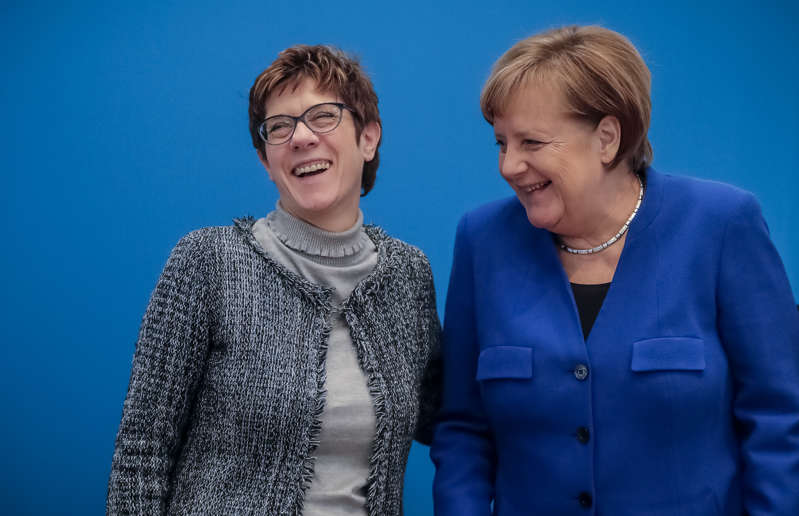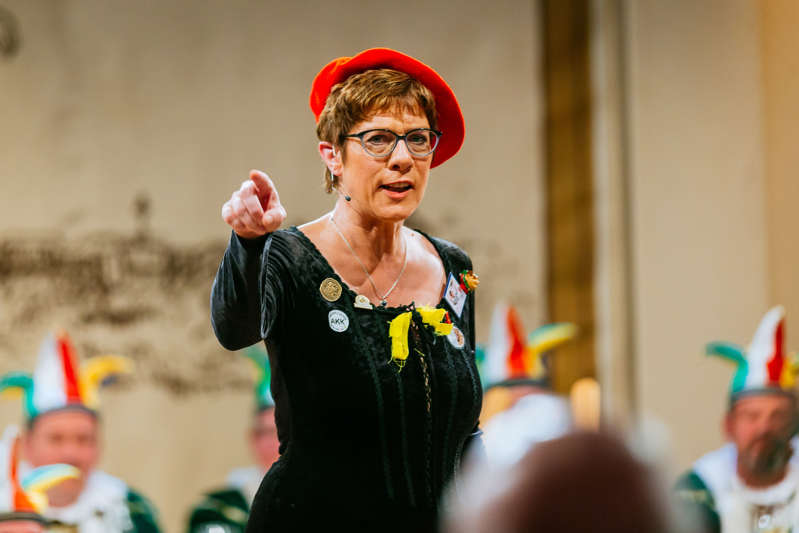
AfD droht empfindliche Geldstrafe
[size]

[/size]
Trump verschleißt sechsten Kommunikationsdirektor
[size]
 © Kai Pfaffenbach/Reuters Annegret Kramp-Karrenbauer, leader of Germany's conservative Christian Democratic Union (CDU), attends a carnival event in Stockach, Germany, on Feb. 28. (Kai Pfaffenbach/Reuters)
© Kai Pfaffenbach/Reuters Annegret Kramp-Karrenbauer, leader of Germany's conservative Christian Democratic Union (CDU), attends a carnival event in Stockach, Germany, on Feb. 28. (Kai Pfaffenbach/Reuters)BERLIN – The likely next leader of Germany wants her fellow citizens to do something that outsiders have been urging for centuries: lighten up.
That was the message of Annegret Kramp-Karrenbauer after a joke she told about gender-neutral bathrooms at a bawdy Carnival celebration sparked an outcry.
The leader of Germany’s largest party – and the
odds-on favorite to succeed Angela Merkel as chancellor – had drawn guffaws in a room full of costume-clad revelers last Thursday when she went on an extended riff about the trendy and culturally progressive ways of Germany’s “poor but sexy” capital, Berlin.
Referencing the city’s hipster café culture, she described a supposed "latte macchiato party," and pointed to “third-gender bathrooms” that, she said, are “for the men who can’t decide if they want to sit or stand when they p*e.” (German men are notoriously expected to sit.)
But if the joke went over well in the southwestern state of Badem-Württemberg
, where Kramp-Karrenbauer was providing the evening entertainment, it landed with a thud elsewhere in Germany – especially in the capital.
Berlin’s deputy mayor called the comments “a travesty.”
“Clumsy jokes against minorities are the last thing that our society needs,” added Justice Minister Katarina Barley, whose Social Democrats are a governing partner of Kramp-Karrenbauer’s Christian Democratic Union.
Rather than apologize, Kramp-Karrenbauer – better known by the acronym AKK – has leaned into the controversy. In a speech on Wednesday night, she assailed her critics as humorless hostages to political correctness.
"If we're so rigid, as has been the case in the past few days, then a piece of tradition and culture in Germany will be ruined. And we shouldn't allow that," she said in her Ash Wednesday address, an annual chance for politicians to settle scores. "Right now, it's as if we're the most uptight people in the world. This cannot go on.”
The joke – and AKK’s decision to escalate the ensuing uproar – reflect a critical difference between her and Merkel.
 © Michael Kappeler/picture alliance via Getty Images
© Michael Kappeler/picture alliance via Getty ImagesDuring last year’s race to succeed the chancellor as CDU leader, AKK was dubbed “mini-Merkel” due to her relative moderation in a field that included two more conservative candidates, her unpretentious nature, her reputation for consensus-building and, in a political world still largely dominated by men, her gender.
But the similarities only go so far. Merkel, a technocrat with a doctorate in chemistry, has largely sought to avoid wading into the culture wars during her 14 years as Germany’s chancellor. When the German parliament, the Bundestag, voted to legalize gay marriage in 2017, Merkel
sided with the dissenters, but had little to say about the issue.
AKK, by contrast, has been far more willing to take on the politics of identity.
An outspoken opponent of gay marriage, the woman who could lead Germany after the country’s next elections once compared the issue to the legalization of incest or polygamy. For her comments, she was named Miss Homophobia 2018 by the rights group Enough is Enough.
 © Thomas Niedermueller/Getty Images Annegret Kramp-Karrnbauer, leader of the German Christian Democrats (CDU), stands on stage during the annual mock-trial during Carnival in which she made a jibe about people of a third sex on March 28, 2019 in Stockach, Germany. Kramp-Karrenbauer said intersex toilets are for “for the men who don’t know if they are still allowed to stand or already have to sit down when they pee” and has since come under fire from both within her own party and other parties with demands she apologize.
© Thomas Niedermueller/Getty Images Annegret Kramp-Karrnbauer, leader of the German Christian Democrats (CDU), stands on stage during the annual mock-trial during Carnival in which she made a jibe about people of a third sex on March 28, 2019 in Stockach, Germany. Kramp-Karrenbauer said intersex toilets are for “for the men who don’t know if they are still allowed to stand or already have to sit down when they pee” and has since come under fire from both within her own party and other parties with demands she apologize.On other issues, too, AKK has been provocative. During the 2015-2016 refugee influx, she had a simple message for male refugees who expressed discomfort with being helped by female volunteers: go home.
Raised in a conservative Catholic family in
the coal-belt Saarland region of western Germany, AKK is different than other top-level German politicians in that she has spent nearly her entire career far from Berlin. Until last year, when Merkel anointed AKK as her preferred successor, the 56-year-old had practiced politics only in Saarland, Germany’s smallest state.
There may be a cold political calculus behind AKK’s bathroom comment, and her urging of her fellow Germans to lighten up.
One of her biggest challenges as the new CDU leader is to claw back the voters who abandoned the center-right party in favor of the far-right Alternative for Germany (AFD).
And one of the AFD’s most successful criticisms of the CDU – and of all mainstream parties – is that they are too beholden to a cosmopolitan elite that is out of touch with more traditional, conservative-minded voters in Germany’s smaller cities and towns.
But even within the CDU, there were some who suggested that AKK had gone too far. Alexander Vogt, head of the CDU’s Group for Lesbians and Gays, told Germany’s Die Welt newspaper that AKK may have wanted “to say something about exaggerated political correctness.”
“But it was directed especially against the group of inter- and transsexuals, who were more than just offended,” Vogt said. “One could have perhaps thought more about who would be the subject of the joke.”
Luisa Beck contributed to this report.[/size]





